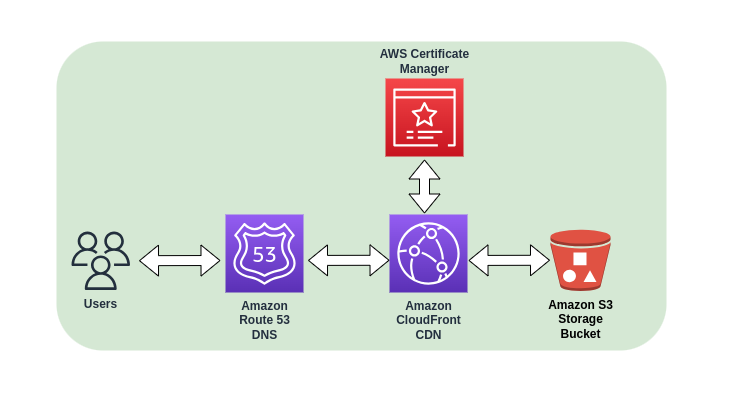Hosting a Zola Static Website on AWS with S3, CloudFront, and ACM

In this post, we'll walk through the steps needed to host a static website built by Zola on AWS using Amazon S3 for storage,
Amazon CloudFront for content delivery, and Amazon Certificate Manager (ACM) for SSL certification. We'll be using
this domain name rustronaut.com as an example.
Now that you have decided on using Zola, the one-stop static site engine built using Rust, you will need to host it. Here is one approach I took using AWS services.
Prerequisites
- Register your domain name, for example
rustronaut.com, with Amazon Route 53. - Create a bucket that corresponds to your domain. I created one named
rustronaut.com. - Run the
zola buildcommand to generate the static site. All the files will be outputted to the defaultpublicdirectory. Upload these files to your S3 bucket.
Step 1: Configure Your S3 Bucket for Static Website Hosting
Navigate to your rustronaut.com bucket in the S3 service in the AWS Management Console. Under the Properties tab,
select Static website hosting. Choose Use this bucket to host a website and enter the name of your index document
(typically index.html). Click Save.
Step 2: Make Your Bucket Content Publicly Accessible
Select the Permissions tab in your bucket settings. Click Block all public access, uncheck it, and save the changes.
Navigate to Bucket Policy and enter the following policy:
{
"Version": "2012-10-17",
"Statement": [
{
"Sid": "PublicReadGetObject",
"Effect": "Allow",
"Principal": "*",
"Action": "s3:GetObject",
"Resource": "arn:aws:s3:::rustronaut.com/*"
}
]
}
Step 3: Set Up a CloudFront Distribution
In the AWS Management Console, navigate to the CloudFront service. Click Create Distribution, choose Web, and select
Get Started.
For the Origin Domain Name, select your rustronaut.com bucket. For the Viewer Protocol Policy, select Redirect HTTP to HTTPS.
Under Cache Key and Origin Request Policy, select Managed-CachingOptimized for the Cache Policy and Managed-AllViewer for the
Origin Request Policy.
Enter your domain name, rustronaut.com, under Distribution Settings -> Alternate Domain Names (CNAMEs).
For SSL Certificate, select Request or Import a Certificate with ACM. Here, you'll request a new certificate for rustronaut.com.
After a little wait, the certificate should be available for selection. Click Create Distribution.
Step 4: Domain Validation and Certificate Issuance
Once you've requested a new certificate, the status will show as Pending Validation. To validate the domain, follow the instructions
in the email that ACM sends to the registered domain owner. Once you validate your domain, the certificate status changes from
Pending Validation to Issued, and it becomes available in the ACM console.
Step 5: Point Your Domain to the CloudFront Distribution
Go to the Route 53 service in AWS Management Console and select your domain under Hosted zones. Create a new record set. For
Type, choose A - IPv4 address. For Alias, choose Yes. For Alias Target, enter the CloudFront distribution domain
name you received in step 3. Click Create.
Step 6: Configure AWS WAF (Optional)
When setting up the CloudFront distribution, you may be asked to select a Web Application Firewall (WAF) policy. Enabling this provides an additional layer of security, but it's optional and may incur additional costs.
After following these steps, you should have a static website hosted on AWS with your custom domain, SSL certificate, and optional WAF security. Propagation can take some time, so don't worry if your site isn't immediately accessible.
Happy hosting!
Software Development
If you're in need of a reliable, experienced, and proficient Rust engineer to strengthen your team and help achieve your project goals, look no further. As a committed team member, I bring my skills to the table, delivering high-quality, efficient, and maintainable code. Let's collaborate and turn your project objectives into robust and efficient solutions. Reach out today to discuss how we can realize your vision together.
Please reach out to discuss rates.